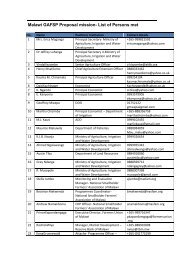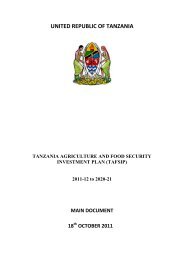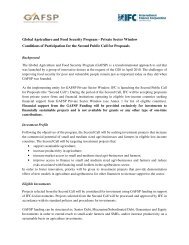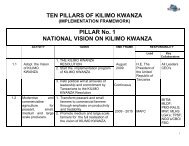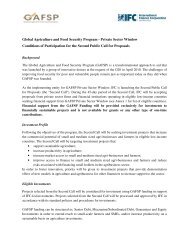Haiti: Poverty Reduction Strategy Paper; IMF Country Report 08/115 ...
Haiti: Poverty Reduction Strategy Paper; IMF Country Report 08/115 ...
Haiti: Poverty Reduction Strategy Paper; IMF Country Report 08/115 ...
You also want an ePaper? Increase the reach of your titles
YUMPU automatically turns print PDFs into web optimized ePapers that Google loves.
• A minimum package of available services, in accordance with a complementary<br />
approach between the various echelons<br />
• Organization and redefinition of the service personnel.<br />
118 The introduction of UCSs represents a genuine challenge for the Ministry. Despite the<br />
investments made to date, only six of these entities are functional out of the 11 programmed for<br />
end-2007, and there are plans to cover the national territory with a total of 56 by 2012. The<br />
problems experienced with implementing this model are both structural and conjunctural, as the<br />
operation of the model is heavily dependent on the pooling of the resources available locally, but<br />
also on intensive participation of the people through their natural leaders and established<br />
authorities.<br />
Objectives<br />
119 The process of definitively setting up the UCSs should enable this local echelon of the health<br />
system to exercise its various functions by giving them the legal authority to do so as well as<br />
resources and means needed to plan, manage, implement, and evaluate their activities. To this<br />
end, the following objectives have been set:<br />
• Revise the legal and institutional framework<br />
• Ensure that the system of health coverage is broadened.<br />
Strategic lines of action<br />
• Drafting of a new framework law on UCSs and a new organic law on the Ministry of<br />
Health<br />
• Preparation of a reference framework for introducing UCSs<br />
• Definition of mechanisms for contracting with partners involved in the process<br />
• Introduction of functional, high-performance UCSs.<br />
STRENGTHENED ASSUMPTION OF CARE FOR PRIORITY DISEASES<br />
120 Owing to their frequency or seriousness, these diseases have a major impact on the state of health<br />
of the people and also have considerable economic consequences, a situation that is all the more<br />
unacceptable in that it can be considerably improved by taking adequate measures. These priority<br />
diseases share the following traits:<br />
• A prevention/information shortfall: prevention requires suitably tailored and timeextensive<br />
measures. In any event, the prevention programs focused on individual<br />
diseases that are currently in place suffer from highly inadequate coverage and should<br />
be strengthened.<br />
• Inadequate assumption of care: despite the support of vertical problems that are more<br />
amply financed (HIV), the assumption of care for such diseases has inadequacies in<br />
terms of screening, access to appropriate care, and sometimes the quality of the care<br />
provided.<br />
• A shortfall in terms of intersectoral collaboration: the prevention of and screening for<br />
these diseases could be significantly improved through sound collaboration with other<br />
sectors, such as the environment, urban planning, or education. Some sectors are<br />
concerned with the assumption of care for particularly vulnerable populations<br />
(prisoners, orphans, prostitutes, etc.).<br />
44





